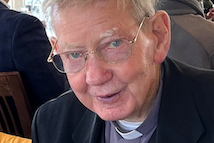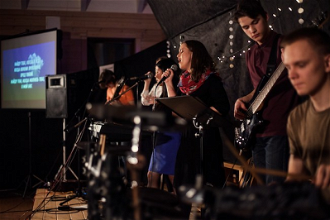Tribute to a Zimbabwean priest
Fr David Gibbs, who died in a road accident in Harare, Zimbabwe on the 29th October, would not have relished being the subject of a magazine or newspaper article during his lifetime.
I know this because I once asked him if he would let me write about his work as a Parish Priest of two parishes, St Theresa's and St Monica's, with their separate churches and congregations, in Seke/Chitungwiza, the Harare dormitory suburb which houses perhaps half a million people.
He was very probably the only white person living in the huge settlement, a tall bearded man puttering around on his motorbike, always wearing a dogcollar, light-blue, short-sleeved "safari" top, khaki trousers and flimsy sandals. He was an unusual priest, too, because he was not one of the European missionaries who have won such honour in devoting their lives to Zimbabwe, but a Zimbabwean, born and bred. And he wouldn't be written about.
First and foremost this was because he was a genuinely humble man who did not believe that his ministry merited particular attention. In addition, however, it seemed to me that he was a little suspicious of newspapers and magazines and the tomfoolery that they seem to involve. He was not an avid follower of the media.
Though his father had been deputy headmaster of a Harare school David was quick to describe himself as "thick as a plank" - though of course he wasn't. It seemed to me that he was not unduly impressed by displays of cleverness.
Nonetheless he had genius. It lay above all in his extraordinary reserves of compassion and powers of empathy, in his ability to relate to people spontaneously and intuitively, to connect, to affirm, to reconcile and to heal.
In coming to terms with the news of his death those who loved him have been drawn together to remember, certainly, and to mourn, but also with a new resolve to build the Zimbabwe he believed in. He was a builder of community. In many ways his life encapsulates the story of the transition from Rhodesia to Zimbabwe.
The son of British immigrants, who gave the best years of their lives as teachers in Zimbabwe, he attended St George's School, a Jesuit foundation, and then worked as a commercial farm manager in rural Banket, Mashonaland.
His sense of vocation developed in discussion with a German missionary, Fr George Sunder SJ and he went on to study for the priesthood in St John Vianney seminary, South Africa after which he was ordained as a diocesan priest by Archbishop Markall SJ in Harare.
He spent some time learning Shona and was then sent to a large rural mission parish, All Souls Mission, Mutoko, some 150 kilometres of Harare. He arrived there at the height of the bush war and shared the anxieties and fears of his congregation and fellow religious. Many in the Rhodesian Security Forces and guerrilla armies alike treated the rural population with callousness and contempt and Church workers were of course not exempt from danger.
A Mission Doctor, an Italian, Dr Luisa Guidotti, was shot and killed by a Rhodesian soldier while driving the unmistakably marked mission ambulance. David was one of the pallbearers at Dr Guidotti's funeral.
Another of the pallbearers was David's most remarkable parishioner, John Bradburne, the "vagabond of God" and "friend of the lepers" who had found his vocation as a servant of the lepers at Mutemwa camp near All Souls Mission. Bradburne, well-born Englishman, mystic and poet, struck up a close friendship with the down-to-earth Zimbabwean priest. It is said that Fr Gibbs clearly recognized the extraordinary grace at work in John Bradburne's life but was also soberly aware of his very human traits, including, unsurprisingly, some degree of eccentricity.
One imagines that John Bradburne would have appreciated the profound respect for others and absolute openness that were Gibbs's trademark. It is fitting that it was David Gibbs who found the body of the servant of the poorest of the poor after he had been killed by ZANLA guerrillas two months after Dr Guidotti's death.
Gibbs was alerted by the unusual swooping and cries of bateleur eagles with which John Bradburne had a particular affinity. Twenty five Catholic missionaries were to die in Zimbabwe in the violent transition from white supremacist rule to majority rule and independence.
"Baba" Gibbs remained at All Souls parish for the duration of the conflict. It greatly influenced his future ministry. He was later to work in Mhondoro, at St Michael's Mission, where he lived for some time at Mubaira, a remote out-station, to be closer to his flock.
Finally Archbishop Patrick Chakaipa brought him to sprawling Seke/Chitungwiza. Gibbs brought great commonsense to his work and was signally prepared, as a faithful Son of the Church, to assist in the development of a theology which took account of the realities under which the poorest and most marginalised of the faithful live.
Debates about the participation of non-Catholics in the sacrament of Communion rather passed him by. His devotion to the Blessed Sacrament was total: a confrere calling upon him one day found him in his simple church, staring at the Tabernacle as if he wished to pierce its metal with his gaze.
When people travelled great distances to attend Mass and then presented themselves before the altar at Communion he made the quite sensible assumption that they were entitled to receive Communion. Perhaps there were times when bright Zimbabwean sunshine shone into his eyes when he was distributing the Host.
The unlooked for result of his trust in his congregation was that he was asked to receive into the Church a number of those who had received the Sacrament from his hand.
Above all other aspects of his ministry, David suffered with his flock day by day as "runyoka", the AIDS "snake" ravaged the country. It is estimated that 3000 people die weekly from the disease in Zimbabwe.
He united himself intensely with the people of God in this horror. He made plain that as far as he understood it by the teaching of the Church obliged him to sanction the use of prophylactics within marriage to avert the spread of AIDS and he did all that he could to educate his parishioners about the risks of promiscuity.
As is the case for many Zimbabwean Christians, the resurgence of political violence in Zimbabwe over the last two years brought great sadness and concern to David Gibbs's life. It brought too a further appraisal of the school of thought within the Christian community which had been willing, sometimes with an unseemly level of zeal, to condone or overlook any and all acts of violence by liberation forces during the bush war.
Twenty five years ago David Gibbs witnessed the way, in the Central African idiom, in which contending elephants had trampled the grass; and now the violence was returning to the lives of the innocent and the weak. Though not a "political" priest he was a "sign that will be contradicted" in the 27 years of his priesthood - both as the servant of black Zimbabweans, not least when they suffered the oppression of minority rule, and secondly in recent months by ministering to white Zimbabweans on isolated farms when they had become a target of injustice and violence.
Despite his clear-sighted and intuitive understanding of the grave problems which Zimbabwe is facing, Baba Gibbs was nonetheless an indefatigable optimist, and an irrepressible lover of our country. There was never any question in his mind about a loving God's desire and intention to bless the long-suffering people of Zimbabwe with eventual justice and peace.
His Requiem Mass in Harare Cathedral was thronged with more than a thousand of the faithful in all their colours and conditions.
A white farmer gave the eulogy. Archbishop Chakaipa wept as he did so. David Gibbs was a loving priest and good friend. He lives on in many hearts. He was a Zimbabwean.


















